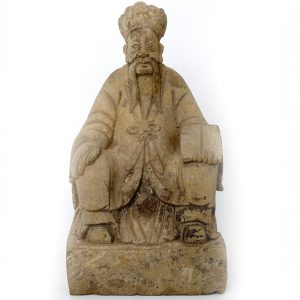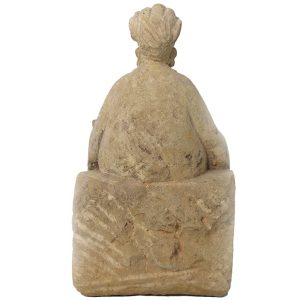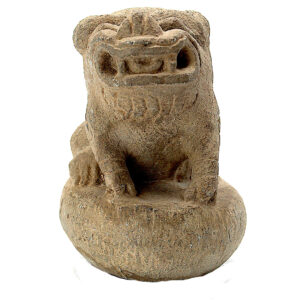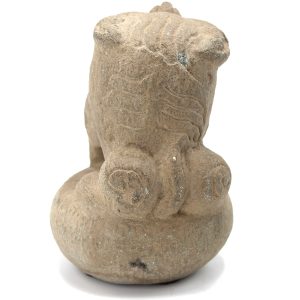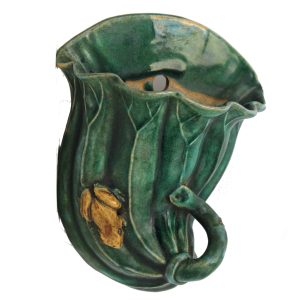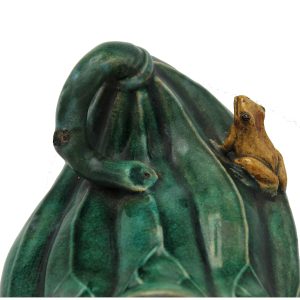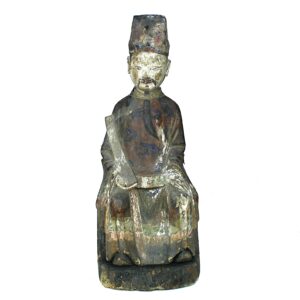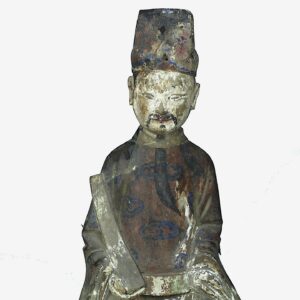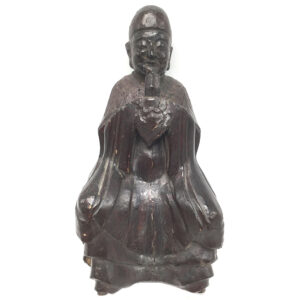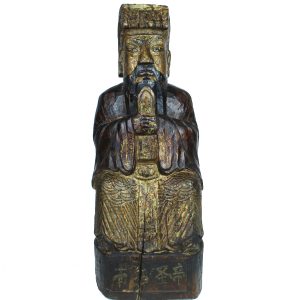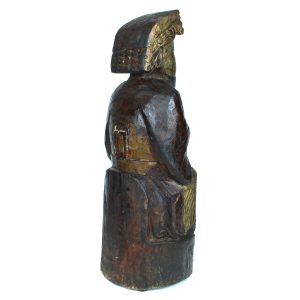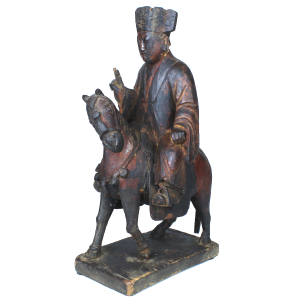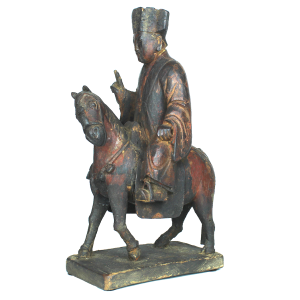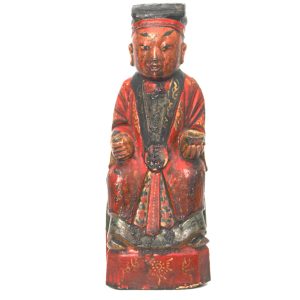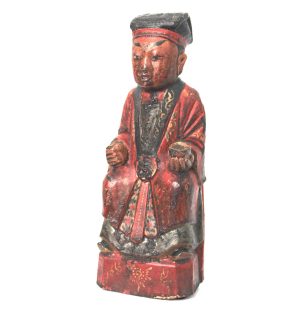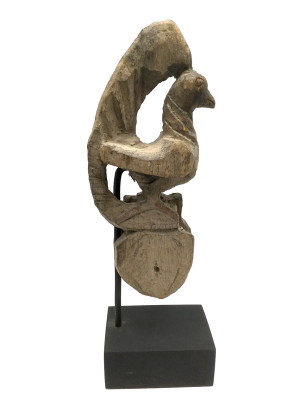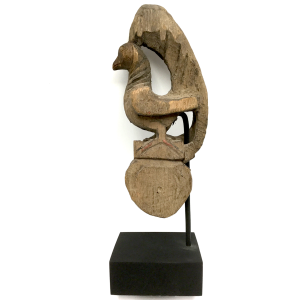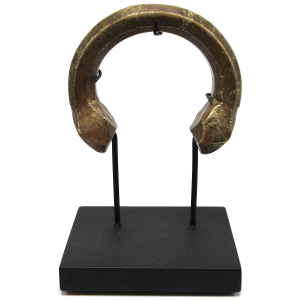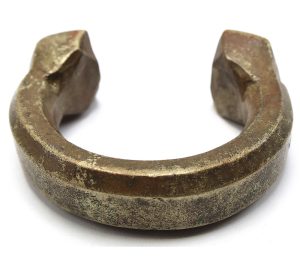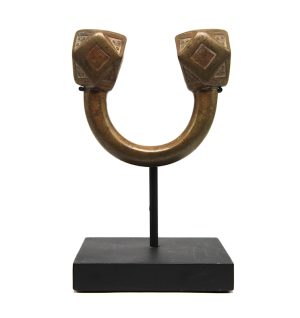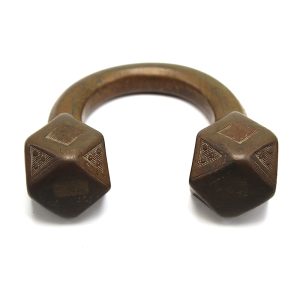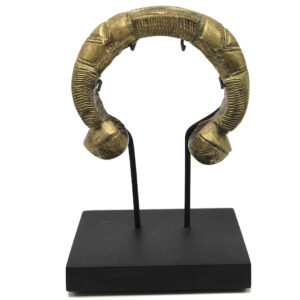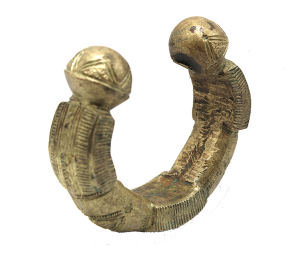Showing 97–108 of 204 results
-
Sale!


$725.00 Original price was: $725.00.$675.00Current price is: $675.00.
H: 8” W: 5” D4” | FREE SHIPPING within continental us
Wonderfully aged and weathered stone Tudi Gong reflecting many traits of this beloved Earth God holding a tael for wealth and fortune. He sat happily on an outdoor shrine, and would be happy to sit in a garden to bring an aura of past times to a new family.
-
Sale!


$195.00 Original price was: $195.00.$155.00Current price is: $155.00.
H: 4.5″ Dia: 3.25″ | FREE SHIPPING WITHIN CONTINENTAL U.S.
This stone flu lion is not an elegant protective beast, it’s just a friendly pet hanging out. He probably lived in a garden and is looking for another one with people like old wonderful pieces to remind them not to take themselves too seriously.
-
Sale!


$285.00 Original price was: $285.00.$225.00Current price is: $225.00.
H: 8.25” W: 6.75” D: 3.5” | FREE SHIPPING WITHIN CONTINENTAL U.S.
Wall pockets are used to hold chopsticks and flowers to bring good fortune. This Shiwan pocket has frog and a lotus that together symbolize nurturing energy and transformation. Great cozy accessory for feng shui and a wonderful wedding gift.
-
Sale!


$295.00 Original price was: $295.00.$215.00Current price is: $215.00.
H: 12.875″ W: 5″ D: 2.75″ | FREE SHIPPING WITHIN CONTINENTAL U.S.
Probably placed on a home altar with other carving, this Taoist official holds a long, curved hu, wearing a high hat, collared robe with painted cobalt blue clouds and official’s belt. Consecrated with original script inside.
-
Sale!


$295.00 Original price was: $295.00.$215.00Current price is: $215.00.
H: 10.5″ W:5″ D: 4″ | FREE SHIPPING WITHIN CONTINENTAL U.S.
Taoist official/priest on backless chair, arms at chest and hands covered by ritual cloth symbolically holding a hu tablet. Darkened by incense and candle smoke from ritualistic offerings it was re-lacquered probably in early 20th-century.
-
Sale!


$395.00 Original price was: $395.00.$295.00Current price is: $295.00.
When ancestral images are taken out of context they are very difficult to identify so we describe them in generic terms as a Chinese Officials or Taoist Officials. This carving may represent the noted historical figure the principal regent Dorgon of the first Qing Emperor Shunzhi who ruled from 1643-1650 as a”quasi” emperor based on…
-
Sale!


$795.00 Original price was: $795.00.$595.00Current price is: $595.00.
H: 13″ W: 4″ D: 7″ | FREE SHIPPING WITHIN CONTINENTAL U.S.
Taoist priest wearing a winged hat with a taotie warning against excess, and hands in the Sword Gesture used to cast out evil and offer blessings. Often on horses, priests were models of morality reflecting the Way of the Tao stressing harmony and oneness with nature.
-
Sale!


$295.00 Original price was: $295.00.$195.00Current price is: $195.00.
H: 7.25″ W: 2.75″ D :2″ | FREE SHIPPING WITHIN CONTINENTAL U.S.
Colorful Taoist priest carving holding a cup with the Elixir of Life granting eternal life. Red is the color of fu to bring into the home divine favors. Whimsically painted face and raised lacquer decorations, it was consecrated and originally placed on a home altar.
-
Sale!


$265.00 Original price was: $265.00.$185.00Current price is: $185.00.
Ht: 10.625″ W: 3.375″ D: 2.5″|FREE SHIPPING WITHIN CONTINENTAL U.S. !
This elegant antique heddle-pulley carved from a single piece of Burmese teak is topped by a hamsa, a goose-like bird and a sacred Buddhist symbol of wisdom. Auspicious symbolic animal images are believed protect the weaver, assure quality weaving, and pleases the gods and spirits. It is wonderfully weathered from time and use with minor losses with a fine patina. Mounted on a black wood base, this heddle pulley pairs well with item number 11298A.
-
Sale!


$295.00 Original price was: $295.00.$225.00Current price is: $225.00.
H: 3.375” W: 3.25” Thick: 1.25” Circum: 5.75” | FREE SHIPPING IN CONTINENTAL u.s.
Large C-shaped Tuareg manilla made from sand moulds, has massive finials with 12 facets with detailed hand-etched and hammered designs including raised circles.
-
Sale!


$325.00 Original price was: $325.00.$295.00Current price is: $295.00.
Ht: 4″ W: 4.6525″ Thick: 1.5″ Circum: 10.5″ | FREE SHIPPING WITHIN CONTINENTAL U.S.
Antique horseshoe shaped Tuareg “King” manilla, magnificent metalwork, 10 faceted flat finial ends with traditional etched and hammered geometric designs, excellent condition, fine patina.
-
Sale!


$295.00 Original price was: $295.00.$225.00Current price is: $225.00.
H: 3.125″ W: 3.125″ D: 0.75″ | FREE SHIPPING WITHIN CONTINENTAL US.
Tuareg horseshoe-shaped manilla with bold hammered and incised decorative motifs unique to individual Tuareg tribes Divided in sections, with etched designs, circular cutouts, ending knot finials. .
End of content
End of content

